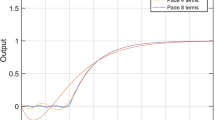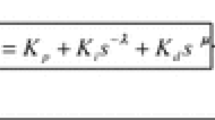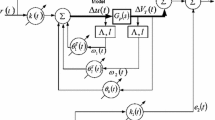Abstract
The heuristic tuning method of fractional-order proportional–integral–derivative (FOPID) control systems lacks robustness, and its performance often changes with specific controlled plants. To solve this problem, this paper proposes a new modified aquila optimizer for tuning the parameters of the FOPID controller, which has strong plant adaptability and can be applied to a large class of different controlled plants. A series of new operational mechanisms, including Tent map-based initialization, probability-based dynamic update, greedy-based Gauss mutation, a fully random search strategy with uniform distribution, and the wraparound dynamic weight update for local exploitation, are proposed to tackle the existing problems of the classical aquila optimizer, such as slow convergence, low precision, and local optimum. Standard benchmark functions are used to test the proposed modified aquila optimizer, showing superior performance in terms of convergence speed, precision, and robustness. The Wilcoxon and Friedman tests statistically proved the significant difference of the modified aquila optimizer from other competitors. Five control system cases with different plants further validate the effectiveness, feasibility, wide adaptability, and superiority of the proposed modified aquila optimizer for regulating FOPID controller parameters. It is approved that the proposed modified aquila optimizer with new mechanisms has wide plant adaptability, deeming a good prospect for the tuning of optimal FOPID controller.












Similar content being viewed by others
Data availability
The data that support the findings of this study are available from the corresponding author upon reasonable request.
References
Abdel-Basset M, Mohamed R, Chakrabortty RK, Sallam K, Ryan MJ (2021) An efficient teaching-learning-based optimization algorithm for parameters identification of photovoltaic models: analysis and validations. Energy Convers Manage 227:113614. https://doi.org/10.1016/j.enconman.2020.113614
Abualigah L, Diabat A, Mirjalili S, Elaziz MA, Gandomi AH (2021a) The arithmetic optimization algorithm. Comput Methods Appl Mech Eng 376:113609. https://doi.org/10.1016/j.cma.2020.113609
Abualigah L, Yousri D, Elaziz MA, Ewees AA, Al-qaness MAA, Gandomi AH (2021b) Aquila optimizer: a novel meta-heuristic optimization algorithm. Comput Ind Eng 157:107250. https://doi.org/10.1016/j.cie.2021.107250
Bhookya J, Kumar JR (2021) Sine-cosine-algorithm-based fractional order PID controller tuning for multivariable systems. Int J Bio-Inspir Comput 17(2):113–120. https://doi.org/10.1504/ijbic.2021.114088
Bhookyaand J, Jatoth RK (2019) Optimal FOPID/PID controller parameters tuning for the AVR system based on sine–cosine-algorithm. Evol Intel 12(4):725–733. https://doi.org/10.1007/s12065-019-00290-x
Carnie SK (1954) Food habits of nesting golden eagles in the coast ranges of California. Condor 56(1):3–12. https://doi.org/10.2307/1364882
Chávez-Vázquez S, Gómez-Aguilar JF, Lavín-Delgado JE, Escobar-Jiménez RF, Olivares-Peregrino VH (2022) Applications of fractional operators in robotics: a review. J Intell Rob Syst 104(4):63. https://doi.org/10.1007/s10846-022-01597-1
Chen YQ, Petras I, Xue DY (2009) Fractional order control—a tutorial. In: American control conference, pp 397–1411. https://doi.org/10.1109/ACC.2009.5160719
Chopra N, Ansari MM (2022) Golden jackal optimization: a novel nature-inspired optimizer for engineering applications. Expert Syst Appl 198:116924. https://doi.org/10.1016/j.eswa.2022.116924
Dekker D (1985) Hunting behavior of golden eagles, aquila-chrysaetos, migrating in southwestern alberta. Can Field Nat 993:383–385
Eberhart R, Kennedy J (1995) A new optimizer using particle swarm theory. In: MHS’95. Proceedings of the sixth international symposium on micro machine and human science, pp 39–43. https://doi.org/10.1109/MHS.1995.494215
Ekinci S, Izci D, Abualigah L, Zitar RA (2023) A modified oppositional chaotic local search strategy based aquila optimizer to design an effective controller for vehicle cruise control system. J Bionic Eng 20:1828–1851. https://doi.org/10.1007/s42235-023-00336-y
Fathollahi-Fard AM, Hajiaghaei-Keshteli M, Tavakkoli-Moghaddam R (2018) The social engineering optimizer (SEO). Eng Appl Artif Intell 72:267–293. https://doi.org/10.1016/j.engappai.2018.04.009
Fathollahi-Fard AM, Hajiaghaei-Keshteli M, Tavakkoli-Moghaddam R (2020) Red deer algorithm (RDA): a new nature-inspired meta-heuristic. Soft Comput 24:14637–14665. https://doi.org/10.1007/s00500-020-04812-z
Fathollahi-Fard AM, Wong KY, Aljuaid M (2023) An efficient adaptive large neighborhood search algorithm based on heuristics and reformulations for the generalized quadratic assignment problem. Eng Appl Artif Intell 126:106802. https://doi.org/10.1016/j.engappai.2023.106802
Guirao JLG, Mohammed PO, Srivastava HM, Baleanu D, Abualrub MS (2022) Relationships between the discrete Riemann–Liouville and Liouville–Caputo fractional differences and their associated convexity results. AIMS Math 7(10):18127–18141. https://doi.org/10.3934/math.2022997
Guo ZX, Yang B, Han YM, He TY, He P, Meng X, He X (2022) Optimal PID tuning of PLL for PV inverter based on aquila optimizer. Front Energy Res 9:2296–2598. https://doi.org/10.3389/fenrg.2021.812467
Heidari AA, Mirjalili S, Faris H, Aljarah I, Mafarja M, Chen HL (2019) Harris Hawks optimization: algorithm and applications. Futur Gener Comput Syst 97:849–872. https://doi.org/10.1016/j.future.2019.02.028
Houssein EH, Emam MM, Ali AA (2021) An efficient multilevel thresholding segmentation method for thermography breast cancer imaging based on improved chimp optimization algorithm. Expert Syst Appl 185:115651. https://doi.org/10.1016/j.eswa.2021.115651
Hussan MR, Sarwar MI, Sarwar A, Tariq M, Ahmad S, Shah Noor Mohamed A, Khan IA, Ali Khan MM (2022) Aquila optimization based harmonic elimination in a modified h-bridge inverter. Sustainability 14(2):929. https://doi.org/10.3390/su14020929
Jarad F, Abdeljawad T, Baleanu D (2017) On the generalized fractional derivatives and their Caputo modification. J Nonlinear Sci Appl 10:2607–2619. https://doi.org/10.22436/JNSA.010.05.27
Joseph SB, Dada EG, Abidemi A, Oyewola DO, Khammas BM (2022) Metaheuristic algorithms for PID controller parameters tuning: review, approaches and open problems. Heliyon 8(5):e09399. https://doi.org/10.1016/j.heliyon.2022.e09399
Kaur S, Awasthi LK, Sangal AL, Dhiman G (2020) Tunicate swarm algorithm: a new bio-inspired based metaheuristic paradigm for global optimization. Eng Appl Artif Intell 90:103541. https://doi.org/10.1016/j.engappai.2020.103541
Khan IA, Alghamdi AS, Jumani TA, Alamgir A, Awan AB, Khidrani A (2019) Salp swarm optimization algorithm-based fractional order PID controller for dynamic response and stability enhancement of an automatic voltage regulator system. Electronics 8(12):1472. https://doi.org/10.3390/electronics8121472
Kumar S, Devarapalli R (2023) Fractional order PIλDμ controller with optimal parameters using modified grey wolf optimizer for AVR system. Archiv Control Sci. https://doi.org/10.24425/acs.2022.141719
Lee CH, Chang FK (2010) Fractional-order PID controller optimization via improved electromagnetism-like algorithm. Expert Syst Appl 37(12):8871–8878. https://doi.org/10.1016/j.eswa.2010.06.009
Li XY, Mobayen S (2022) Optimal design of a PEMFC-based combined cooling, heating and power system based on an improved version of aquila optimizer. Concurr Comput Pract Exper 34(15):e6976. https://doi.org/10.1002/cpe.6976
Li Z, Liu L, Dehghan S, Chen YQ, Xue DY (2017) A review and evaluation of numerical tools for fractional calculus and fractional order controls. Int J Control 90(6):1165–1181. https://doi.org/10.1080/00207179.2015.1124290
Machado JAT, Azenha A (1998) Fractional-order hybrid control of robot manipulators. In: SMC'98 conference proceedings. 1998 IEEE international conference on systems, man, and cybernetics, vol 1, pp 788–793. https://doi.org/10.1109/ICSMC.1998.725510
Meinertzhagen R (1940) How do larger raptorial birds hunt their prey. Ibis 4(3):530–535
Micev M, Ćalasan M, Oliva D (2020) Fractional order PID controller design for an AVR ystem using chaotic yellow saddle goatfish algorithm. Mathematics 8(7):1182. https://doi.org/10.3390/math8071182
Mirjalili S (2015) The ant lion optimizer. Adv Eng Softw 83:80–98. https://doi.org/10.1016/j.advengsoft.2015.01.010
Mirjalili S (2016) SCA: a sine cosine algorithm for solving optimization problems. Knowl-Based Syst 96:120–133. https://doi.org/10.1016/j.knosys.2015.12.022
Mirjalili S, Lewis A (2016) The Whale optimization algorithm. Adv Eng Softw 95:51–67. https://doi.org/10.1016/j.advengsoft.2016.01.008
Mirjalili S, Mirjalili SM, Lewis A (2014) Grey Wolf optimizer. Adv Eng Softw 69:46–61. https://doi.org/10.1016/j.advengsoft.2013.12.007
Muresan CI, Birs I, Ionescu C, Dulf EH, De Keyser R (2022) A review of recent developments in autotuning methods for fractional-order controllers. Fractal Fract 6(1):37. https://doi.org/10.3390/fractalfract6010037
Ong KM, Ong P, Sia CK (2021) A carnivorous plant algorithm for solving global optimization problems. Appl Soft Comput 98:106833. https://doi.org/10.1016/j.asoc.2020.106833
Podlubny I (1999) Fractional-order systems and PIλDμ-controllers. IEEE Trans Autom Control 44(1):208–214. https://doi.org/10.1109/9.739144
Ravari MA, Yaghoobi M (2019) Optimum design of fractional order PID controller using chaotic firefly algorithms for a control CSTR system. Asian J Control 21(5):2245–2255. https://doi.org/10.1002/asjc.1836
Rodríguez-Molina A, Mezura-Montes E, Villarreal-Cervantes MG, Aldape-Pérez M (2020) Multi-objective meta-heuristic optimization in intelligent control: a survey on the controller tuning problem. Appl Soft Comput 93:106342. https://doi.org/10.1016/j.asoc.2020.106342
Salawudeen AT, Nyabvo PJ, Nuhu AS, Akut EK, Cinfwat KZ, Momoh IS, Imam ML (2020) Recent metaheuristics analysis of path planning optimization problems. In: 2020 International conference in mathematics, computer engineering and computer science (ICMCECS), pp 1–7. https://doi.org/10.1109/ICMCECS47690.2020.240845
Seyyedabbasi A, Kiani F (2023) Sand Cat swarm optimization: a nature-inspired algorithm to solve global optimization problems. Eng Comput 39:2627–2651. https://doi.org/10.1007/s00366-022-01604-x
Shehab M, Abualigah L, Hamad HA, Alabool H, Alshinwan M, Khasawneh AM (2020) Moth–flame optimization algorithm: variants and applications. Neural Comput Appl 32:9859–9884. https://doi.org/10.1007/s00521-019-04570-6
Shi LL, Liu M, Liu Y, Zhao QJ, Cheng K, Zhang HH, Fathollahi-Fard AM (2022) Evaluation of urban traffic accidents based on pedestrian landing injury risks. Appl Sci 12(12):6040. https://doi.org/10.3390/app12126040
Sony MG, Thomas LP, Deepak M, Mathew AT (2022) Frequency regulation on an interconnected power system with fractional PID controllers optimized using RAO algorithms. Electr Power Compon Syst 50(13):683–695. https://doi.org/10.1080/15325008.2022.2139437
Sumathi R, Umasankar P (2020) New opposition cuttlefish optimizer based two-step approach for optimal design of fractional order proportional integral derivative controller for time delay systems. Int J Numer Model Electron Netw Devices Fields 33(2):e2708. https://doi.org/10.1002/jnm.2708
T’kindt V, Bouibede-Hocine K, Esswein C (2007) Counting and enumeration complexity with application to multicriteria scheduling. Ann Oper Res 153(1):215–234. https://doi.org/10.1007/s10479-007-0175-3
Tarasov VE (2021) General fractional calculus: multi-kernel approach. Mathematics 9(13):1501. https://doi.org/10.3390/math9131501
Wang HY, Lu JB (2022) Research on fractional order fuzzy PID control of the pneumatic-hydraulic upper limb rehabilitation training system based on PSO. Int J Control Autom Syst 20(1):310–320. https://doi.org/10.1007/s12555-020-0847-1
Wang S, Jia HM, Abualigah L, Liu QX, Zheng R (2021) An improved hybrid aquila optimizer and Harris hawks algorithm for solving industrial engineering optimization problems. Processes 9(9):1551. https://doi.org/10.3390/pr9091551
Watson J (2010) The golden eagle. Bloomsbury Publishing, London
Yang HY, Yang YZ, Han FJ, Zhao M, Guo L (2019) Containment control of heterogeneous fractional-order multi-agent systems. J Franklin Inst 365(2):752–765. https://doi.org/10.1016/j.jfranklin.2017.09.034
Yumuk E, Güzelkaya M, Eksin İ (2020) Optimal fractional-order controller design using direct synthesis method. IET Control Theory Appl 14(18):2960–2967. https://doi.org/10.1049/iet-cta.2020.0596
Zhang FX, Yang CH, Zhou XJ, Gui WH (2018) Fractional-order PID controller tuning using continuous state transition algorithm. Neural Comput Appl 29(10):795–804. https://doi.org/10.1007/s00521-016-2605-0
Zhang YT, Zhu Z, Ning W, Fathollahi-Fard AM (2022) An improved optimization algorithm based on density grid for green storage monitoring system. Sustainability 14(17):10822. https://doi.org/10.3390/su141710822
Zhao J, Gao ZM (2022) The heterogeneous aquila optimization algorithm. Math Biosci Eng 19(6):5867–5904. https://doi.org/10.3934/mbe.2022275
Zhao CN, Jiang MR, Huang YQ (2022a) Formal verification of fractional-order PID control systems using higher-order logic. Fractal Fract 6(9):485. https://doi.org/10.3390/fractalfract6090485
Zhao SJ, Zhang TR, Ma SL, Chen M (2022b) Dandelion optimizer: a nature-inspired metaheuristic algorithm for engineering applications. Eng Appl Artif Intell 114:105075. https://doi.org/10.1016/j.engappai.2022.105075
Zhu HM, El-Sherbeeny AM, El-Meligy MA, Fathollahi-Fard AM, Li ZW (2023) Verification of current-state opacity in discrete event systems by using basis coverability graphs. Mathematics 11(8):1798. https://doi.org/10.3390/math11081798
Funding
This work is supported by the Key Technologies R&D Program of Sichuan Province, China under Grant No. 23ZDYF0471 and by the Doctoral Research Fund of Southwest University of Science and Technology under Grant No. 22zx7140. The authors also thank the anonymous reviewers for their insightful and constructive comments.
Author information
Authors and Affiliations
Corresponding author
Ethics declarations
Conflict of interest
The authors have no competing interests to declare that are relevant to the content of this article.
Ethical approval
No participation of humans takes place in this implementation process.
Human and animal rights
No violation of human and animal rights is involved.
Additional information
Publisher's Note
Springer Nature remains neutral with regard to jurisdictional claims in published maps and institutional affiliations.
Rights and permissions
Springer Nature or its licensor (e.g. a society or other partner) holds exclusive rights to this article under a publishing agreement with the author(s) or other rightsholder(s); author self-archiving of the accepted manuscript version of this article is solely governed by the terms of such publishing agreement and applicable law.
About this article
Cite this article
Ni, L., Li, Y., Zhang, L. et al. A modified aquila optimizer with wide plant adaptability for the tuning of optimal fractional proportional–integral–derivative controller. Soft Comput (2023). https://doi.org/10.1007/s00500-023-09473-2
Accepted:
Published:
DOI: https://doi.org/10.1007/s00500-023-09473-2




